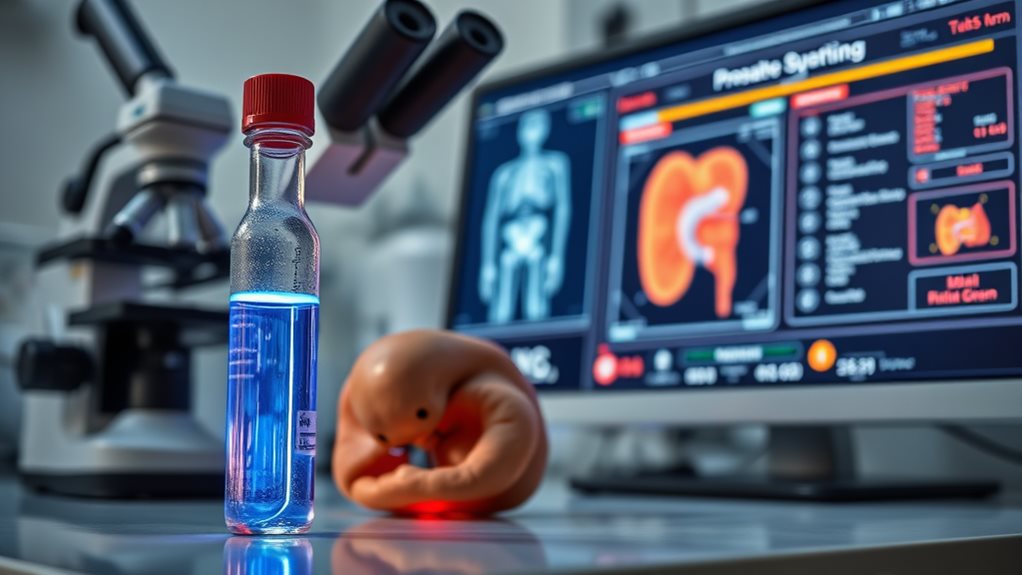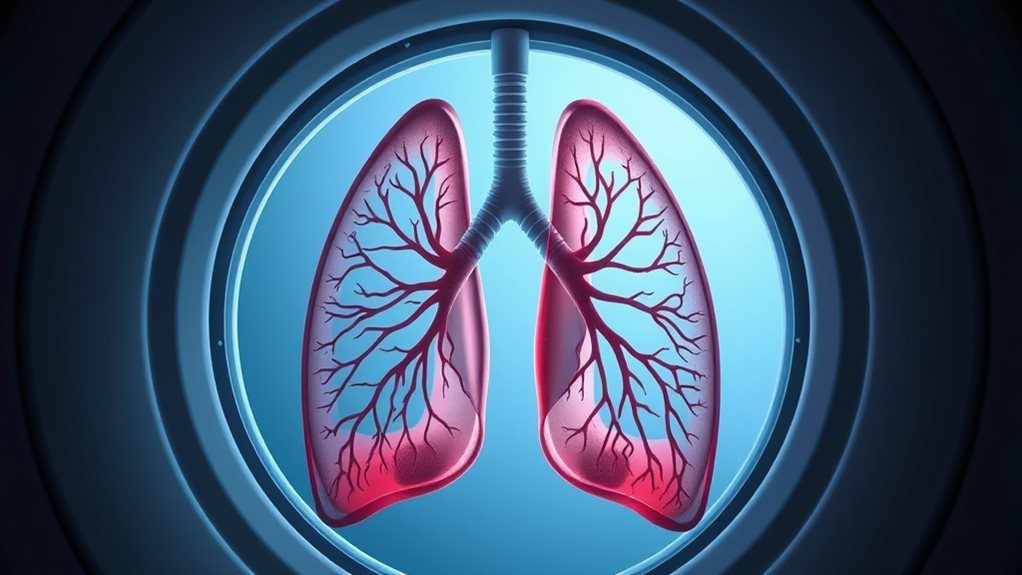5 Essential Cancer Screenings Every Man Must Know
You've probably heard the saying "prevention is better than cure," but when it comes to cancer screenings, many men still take a passive approach. Don't wait until symptoms appear - by then, treatment options may be limited. While discussing cancer isn't comfortable, knowing these five essential screening tests can make the difference between early detection and a challenging battle. Let's explore what you need to know about protecting your health at every age.
Key Takeaways
PSA blood tests starting at age 50 help detect prostate cancer early, with earlier screening recommended for high-risk individuals.
Colorectal cancer screening should begin at age 45 through methods like colonoscopy or FIT testing.
Regular skin cancer checks using the ABCDE method, combined with annual professional examinations, help identify suspicious moles.
Current and former smokers aged 50-80 with extensive smoking history should undergo annual low-dose CT scans.
Annual oral cancer screenings during dental visits examine inner cheeks, tongue, and throat for early detection.
Understanding Prostate Cancer Screening: The PSA Test

While many men feel anxious about prostate cancer screening, understanding the PSA (Prostate-Specific Antigen) test can help ease those concerns. The PSA test measures the level of a specific protein in your blood that's produced by the prostate gland. Higher levels may indicate prostate cancer, but can also result from other conditions.
You'll need to discuss PSA testing with your doctor starting at age 50, or earlier if you're at higher risk due to family history or African American heritage. The test involves a simple blood draw, and you'll get results within days.
If your PSA levels are elevated, your doctor may recommend additional tests like a prostate biopsy. Regular screening helps detect prostate cancer early when it's most treatable, giving you the best chance for successful treatment.
Men with multiple affected relatives should begin PSA screening at age 40 to ensure early detection and optimal health outcomes.
Colorectal Cancer Detection: When to Start Regular Testing
Three key factors determine when you should begin colorectal cancer screening: age, family history, and overall health risk factors. For most men, screening should start at age 45, but you'll need to begin earlier if you have a family history of colorectal cancer or certain genetic conditions. Men who maintain prostate-protective eating habits can better support their overall digestive health while managing cancer risks.
| Screening Method | Frequency | Key Benefits |
|---|---|---|
| Colonoscopy | Every 10 years | Most thorough view |
| FIT Test | Yearly | Non-invasive |
| Sigmoidoscopy | Every 5 years | Less prep needed |
| Stool DNA Test | Every 3 years | At-home option |
| CT Colonography | Every 5 years | No sedation required |
Don't wait for symptoms to appear before getting screened. Early detection dramatically improves treatment outcomes. Talk to your doctor about which screening method best suits your situation and health profile.
Skin Cancer Checks: What to Look For and How Often
When should men examine their skin for potential cancer signs?
You should perform monthly self-examinations and get a professional skin check annually, especially if you're over 40 or have risk factors like fair skin or family history.
Use the ABCDE method to spot suspicious moles: check for Asymmetry, irregular Borders, varying Colors, Diameter larger than 6mm, and Evolution or changes over time.
Pay special attention to areas frequently exposed to sun, including your face, neck, arms, and hands.
Don't forget hard-to-see spots like your back, scalp, and between toes. Use mirrors or ask a partner to help examine these areas.
If you notice any unusual growths, new moles, or changes in existing ones, contact your healthcare provider immediately for evaluation.
Taking a zinc-rich diet can support skin health by aiding in cell regeneration and repair of tissue damage.
Lung Cancer Screening for Current and Former Smokers

Since smoking remains the leading cause of lung cancer, regular screening is essential for both current and former smokers.
If you're between 50 and 80 years old and have a 20 pack-year smoking history, you should get annual low-dose CT scans. Pack-years are calculated by multiplying the number of packs smoked daily by the number of years you've smoked.
If you're a current smoker, you'll need to continue screenings yearly. If you've quit within the past 15 years, you should also maintain regular screenings.
The CT scan is quick, painless, and can detect lung cancer in its early stages when it's most treatable. Your doctor will help determine if you meet the screening criteria and guide you through the process.
Oral Cancer Examination: A Critical Yet Overlooked Test
Although oral cancer affects thousands of men annually, many skip this essential screening during routine dental visits.
You've got a much better chance of successful treatment when your dentist catches signs early. This quick, painless examination can detect potentially dangerous changes in your mouth's soft tissues.
During the screening, your dentist will check these key areas:
- Inner cheeks and lips for unusual patches or sores
- Tongue surface and sides for discoloration or lumps
- Floor and roof of your mouth for abnormalities
- Throat and tonsil area for suspicious growths
Don't wait for symptoms to appear - schedule this screening at least once a year.
If you use tobacco products, drink alcohol regularly, or have a family history of oral cancer, you'll need more frequent checks.
Tell your dentist about any persistent mouth sores or changes in your oral health.
Frequently Asked Questions
Can Certain Foods or Supplements Help Prevent Cancer Development?
While no single food can prevent cancer completely, you'll benefit from a diet rich in antioxidants and cancer-fighting compounds.
Load up on colorful fruits, vegetables, whole grains, and lean proteins. Foods like berries, leafy greens, tomatoes, and fatty fish can help reduce cancer risk.
However, don't rely solely on supplements - it's best to get nutrients from whole foods as part of a balanced diet.
Does Family History Affect How Early I Should Start Cancer Screenings?
Just as a family tree's roots run deep, your genetic heritage plays a vital role in cancer risk.
If you've got close relatives who've had cancer, especially at younger ages, you'll want to start screenings earlier than the general guidelines suggest.
You should typically begin testing 10 years before the age your family member was diagnosed.
Don't wait - talk to your doctor about your family history to create a personalized screening plan.
Are There Any Cancer Screenings Covered by Insurance Before Recommended Ages?
Many insurance plans will cover early cancer screenings if you have specific risk factors, especially family history or genetic predisposition.
You'll need documentation from your healthcare provider to justify early screening. It's best to contact your insurance provider directly to understand your coverage options.
Some plans even cover genetic testing like BRCA mutations, which can help determine if you need earlier screenings.
How Accurate Are At-Home Cancer Screening Test Kits?
Like rolling dice in a high-stakes game, at-home cancer screening tests aren't always a safe bet.
While they're convenient, their accuracy can vary considerably. You'll find that colorectal cancer home tests are among the most reliable, with up to 95% accuracy when used correctly.
However, many other at-home cancer tests haven't been thoroughly validated, and you shouldn't rely on them as your only screening method.
Always consult your doctor for proper testing.
Should I Get Screened More Frequently if I Have Multiple Risk Factors?
Yes, you'll need more frequent screenings if you have multiple risk factors.
Your doctor should adjust your screening schedule based on your specific risk profile, including family history, lifestyle habits, and environmental exposures.
Don't wait for standard age-based recommendations if you're at higher risk.
Instead, work with your healthcare provider to create a personalized screening plan that accounts for all your risk factors.
Conclusion
Picture yourself as the captain of your health journey, steering clear of cancer's stormy waters. You've now got a powerful navigation system - these five essential screenings. Don't let fear keep you anchored in uncertainty. By staying vigilant with these tests, you're not just protecting your health; you're charting a course for a longer, healthier life. Take control and make these screenings your regular checkpoints.
Suggested next read: Best Gut Supplements For Men Over 50
